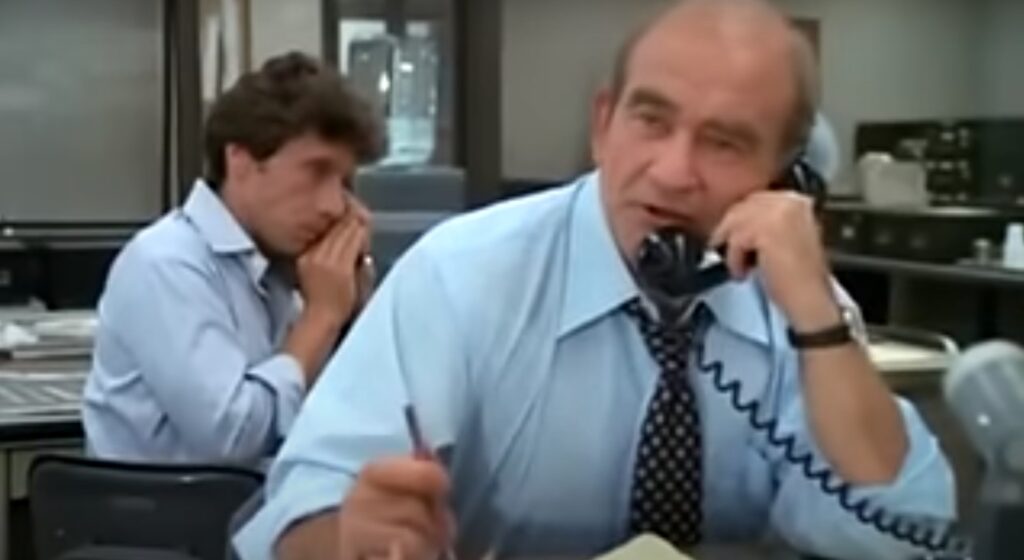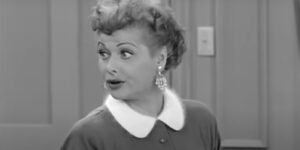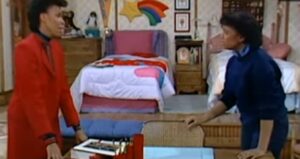
Today, we look at how Lou Grant wasted no time before getting right to work in its first episode.
This is “All the Best Things,” a spotlight on the best TV episodes, movies, albums, etc.
This is a Year of Great TV Episodes, where every day this year, we’ll take a look at great TV episodes. Note that I’m not talking about “Very Special Episodes” or episodes built around gimmicks, but just “normal” episodes of TV shows that are notable only because of how good they are.
The opening episode of the Lou Grant, “Cophouse,” is one of the most astonishing pilot scripts I’ve ever seen, not because it is such a great episode, although it is, but because it has to achieve two EXTREMELY different things, two things that 90% of other shows would just spread out over two episodes, but it gets them both done in the same episode.
You see, Ed Asner’s Lou Grant was, of course, was a beloved figure on the long-running sitcom, The Mary Tyler Moore Show, as the boss to Mary Tyler Moore’s Mary Richards at a Minneapolis TV station in the news department. The series ends with most of the cast losing their jobs.
So now, in this new series, Grant moves to Los Angeles for a job at a Los Angeles newspaper, but is surprised that his old friend Charlie (Mason Adams), the managing editor of the paper, is offering him the city editor job (he thought he would have to go back to just reporting). So the episode has to show us Lou Grant moving to Los Angeles and getting acclimated to his new city.
However, we also need to show a hard-hitting story about a newspaper trying to break a big story, and the episode manages to put BOTH of those plots into the same episode. In the first 20 minutes or so, we get Lou Grant’s backstory and him being hired, but then the rest of the episode is an in-depth look at how to break a story, with Grant working with his two star reporters, Joe Rossi (Robert Walden) and Carla Mardigian (Rebecca Balding) to break a police scandal, a story that the paper’s longtime police beat reporter, George Driscoll (Peter Hobbs) has been covering up so as to not alienate his position as a friend to the cops.
Driscoll is a former alcoholic, and when Grant puts him on a week’s vacation so that Rossi could do the story without any blowback on Driscoll, Driscoll, ashamed at himself, starts drinking again. Lou tells him he’s finished on the cop beat, but then Driscoll shows up and writes a wonderful, hard-hitting story about both the scandal and the fact that reporters like him cover up stories like this all of the time in order to maintain their access.
However, Grant’s old friend, Charlie, won’t print the story, as the owner of the newspaper, Mrs. Pynchon (the remarkable Nancy Marchand), doesn’t want to alienate the cops, either. Lou calls her out on it, and in the end, she runs the story, impressing Lou.
There’s such wonderful nuance in the story, though, as Rossi, who hates authority, is railing against the cops for the scandal (some cops had sex with some 16-year-old girls while off duty as part of a police-sponsored sports team), but episode writer Leon Tokatyan stresses how much conjecture Rossi is bringing to his story, based on how much he dislikes cops.
It’s such a well-formulated episode, with excellent directing by Gene Reynolds, and a wonderful start to a great TV drama.
Okay, if I’m going to have 335 more of these, I could use suggestions, so feel free to email me at brian@poprefs.com!










LOU GRANT also successfully took a supporting character from a sitcom and recast him as the lead in a drama. That is a feat that 99.9% of shows either couldn’t pull off or wouldn’t be rewarded for doing by a network and/or viewers. Instead it ran 5 seasons for 114 episodes on CBS, which is a very solid run. Ed Asner played the character for 12 seasons. For retrospect, that’s one season longer than Ed O’Neill played Al Bundy, and even one season longer than Dennis Haskins played Mr. Belding across three sitcoms (“Good Morning, Miss Bliss,” “Saved By The Bell” & “Saved By The Bell: The New Class”).
Has any character gone from sitcom to drama and had it work out so well for as long? The closest I can think of is John Munch, played by Richard Belzer, but even Munch never starred in a sitcom; merely guest-starred in random episodes of several sitcoms (like “30 Rock” or “Arrested Development”).
I know its not what you meant, but since your question is “Has any CHARACTER (emphasis added) gone from sitcom to drama and had it work put so well for so long?”
Trapper John ‘s spinoff lasted 7 seasons.
The only episode Of Lou Grant I remember is the Season 1 Christmas episode which they reran every year the show was on.